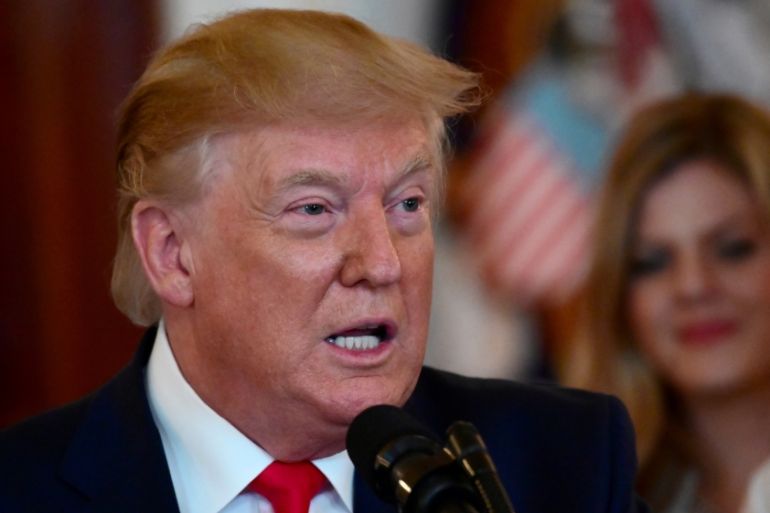Trump threatens to ratchet up sanctions on Iran ‘soon’
Iran says it has ‘nothing to hide’ as UN nuclear watchdog holds emergency meeting to discuss Tehran’s nuclear programme.

President Donald Trump has repeated the United States‘ threat to ratchet up sanctions on Tehran and again denounced the 2015 nuclear deal Iran signed with world powers.
Trump’s latest threat came via a tweet on Wednesday as the UN nuclear watchdog held an emergency meeting to discuss Iran’s nuclear programme.
Keep reading
list of 4 itemsKey takeaways as Cohen faces more questioning on day 17 of Trump’s trial
Michael Cohen resumes testimony in Trump hush-money trial
Key takeaways as ex-Trump lawyer Michael Cohen testifies in New York trial
“Iran has long been secretly ‘enriching,’ in total violation of the terrible 150 Billion Dollar deal made by John Kerry and the Obama Administration. Remember, that deal was to expire in a short number of years. Sanctions will soon be increased, substantially!” Trump tweeted without elaborating or offering evidence.
Iran responded to the US president’s allegations, saying “we have nothing to hide”.
Although Iran was found to have had covert enrichment sites long before the nuclear accord, the deal also imposed the most intrusive nuclear supervision on Iran of any country, and there has been no serious suggestion Iran is secretly enriching now.
Trump last year unilaterally abandoned the 2015 Iran nuclear deal and reinstated punishing sanctions on the country.
At Wednesday’s International Atomic Energy Agency’s (IAEA) board meeting, the US sought to pressure Iran over breaches of the 2015 international nuclear deal, accusing it of extortion and pledging to continue sanctions while still offering to hold talks.
Iran’s representative to international organisations in Vienna, Kazem Gharib Abadi, said at the meeting that US actions were “neither legitimate nor legal” and should not be accepted by the international community.
‘Unchangeable strategy’
The US called for the IAEA meeting after Iran announced last week that it had exceeded the amount of low-enriched uranium it is allowed to stockpile under the 2015 nuclear deal with world powers. Since then, it also announced it has started enriching uranium past the 3.67 percent purity allowed, to 4.5 percent. The IAEA has verified both developments.
Iranian President Hassan Rouhani said on Wednesday that Tehran’s measures were within the framework of the deal.
Separately, a senior Iranian security official said on Wednesday that Iran will not reverse its decision to increase uranium enrichment beyond the limits until it achieves its “full rights” under the deal.
The official IRNA news agency quoted Ali Shamkhani, the secretary of the Supreme National Security Council of Iran, as telling a French envoy on Wednesday that the decision to increase enrichment is an “unchangeable strategy”.
Shamkhani went on to criticise the European powers for their “lack of will” in providing relief from US sanctions.
Washington, meanwhile, is set on isolating Iran to force it to negotiate over the nuclear pact, its missile programme and its actions in the region.
Trump had previously warned Iran to “be careful” with its uranium enrichment, saying the country will “never have a nuclear weapon”. US Secretary of State Mike Pompeo had also previously warned of increased sanctions.
Iran denies seeking nuclear weapons and refers to a religious decree issued in the early 2000s by Supreme Leader Ali Hosseini Khamenei that forbids “the production, stockpiling and use of weapons of mass destruction, and specifically nuclear arms”.
Iranian officials and observers have derided Washington’s apparent demand Iran respect a deal it had abandoned.
The multilateral pact saw Iran accept drastic limits on its nuclear programme and to submit to IAEA inspections in exchange for a partial lifting of crippling international sanctions.
But Trump’s withdrawal from the deal on May 8, 2018 – and subsequent sanctions – have deprived Iran of the economic benefits it expected and dealt an additional blow to its economy.
European states, which have opposed the US move, have struggled to respond.
Diplomats from several countries on the IAEA board said that while fiery exchanges between the Iranian and US envoys were likely at the meeting at agency headquarters, they did not expect the board to take any concrete action.
The United Kingdom, France and Germany are considering their next move, torn between the urge to show their displeasure at Iran’s breach of the deal and are wanting to keep alive a pact that signatories in 2015 touted as vital to preventing wider war in the Middle East.